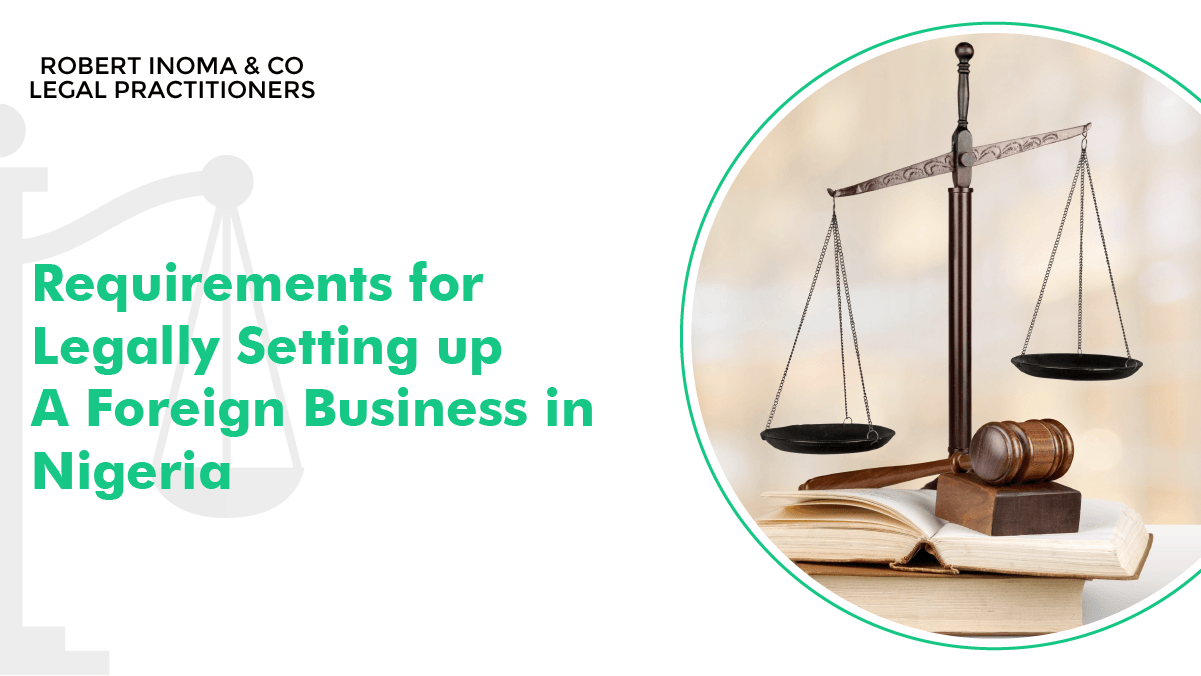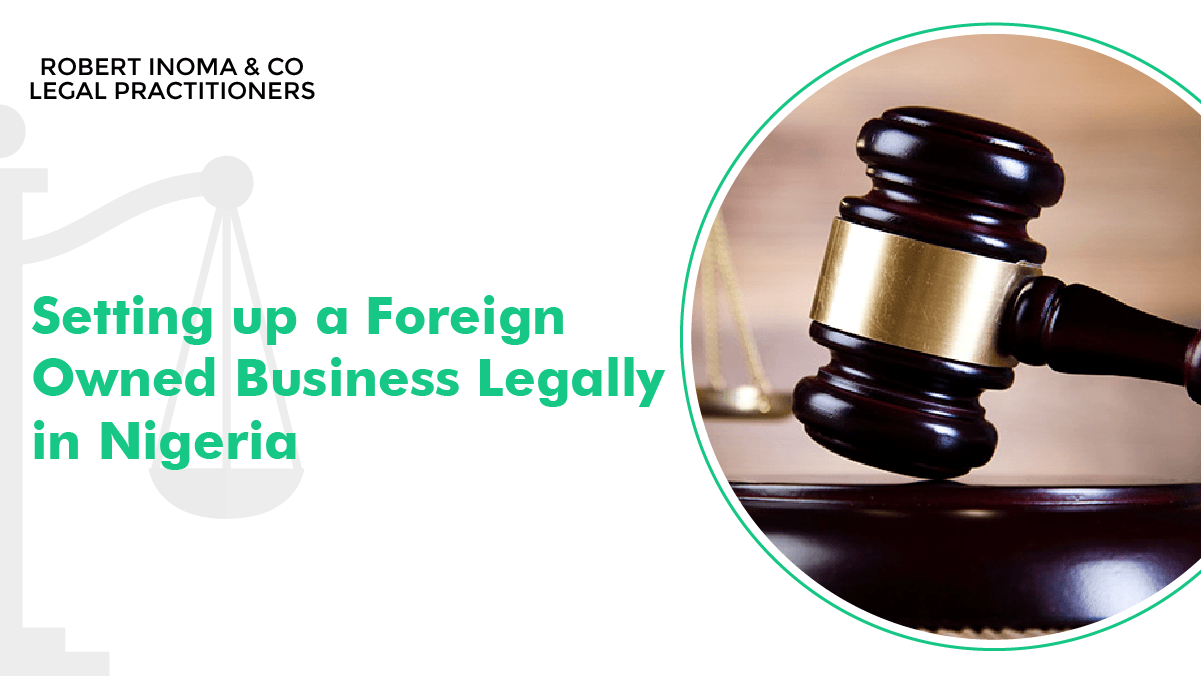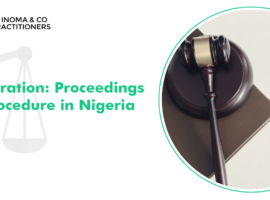Setting up a Foreign-Owned Business Legally in Nigeria
Every company that is legally set up in a country can also be legally established in any other country in the world. In Nigeria, setting up a foreign or subsidiary company is somewhat simple. The requirements and procedures for setting up a foreign business in Nigeria are almost the same for setting up a local business in Nigeria except for a few additions. The procedure for legally setting up a foreign or local business in Nigeria is governed by the Companies and Allied Matters Act (CAMA) 2004.
A foreign establishment can open a branch or subsidiary office/agency in Nigeria if it fulfills all legal requirements in obtaining incorporation as a branch or separate legal entity. Company Registration and incorporation is the only way a foreign business can become a separate legal entity and be legitimate. If a foreign person seeks to set up a business in Nigeria, he/she must also meet all incorporation requirements stipulated by the law in Nigeria. No foreign individual or company can carry on business in Nigeria legally except it is incorporated.
Contents
Requirements for Legally Setting up A Foreign Business in Nigeria

For a foreigner or a foreign company to legitimately carry on business in Nigeria, the following requirements must be met
- Company Registration with CAC
- Obtain Business Permit
- Registration with Nigeria Investment Promotion Commission (NIPC)
- Obtain Tax Identification Number (VAT), Value Added Tax (VAT), and Tax Clearance Certificate (TCC)
- Obtain Nigerian Expatriate quotas
- Combined Expatriate Residence Permit and Aliens Card (CERPAC)
- Export Certificate (where necessary)
- Requisite License (where necessary)
- Certificate of Capital Importation for equity or business loans.
The requirements listed above must be met before a foreign company can be established in Nigeria.
Company Registration with CAC
The very first step in setting up a foreign business in Nigeria is to incorporate it. Setting a foreign business in Nigeria starts by registering the company with the Corporate Affairs Commission (CAC). This registration has to be done with a minimum of N10, 000,000 authorized share capital. The foreign individual or company does not have to immediately pay the amount to the government or any Nigerian entity, but having that amount of share capital shows the promoter’s risk and liability to the company.
In incorporation, the company must have a minimum of two (2) shareholders and two directors. In the absence of a second director, the foreign entity can hire a local director or shareholder in order to comply with the provisions of CAMA. It is not acceptable under the law, for a single individual to form a company in Nigeria, whether foreign or local.
Registration with NIPC
Another requirement in setting up a foreign business in Nigeria is registration with the Nigeria Investment Promotion Commission (NIPC). The NIPC is the governmental body that supervises, promotes, and monitors all investments done in Nigeria. The NIPC was set up to coordinate, manage and provide the necessary investment guidelines to enterprises in Nigeria. Before a foreign company can get the NIPC certificate it must first be registered with CAC, and meet other requirements depending on the nature of the company. Under the NIPC Act, no foreign enterprise can be nationalized without first registering with the NIPC. Registration with the NIPC is mandated for every foreign business, and without it, one cannot obtain a business permit.
Business Permit
The business permit is issued by the Ministry of Interiors in Nigeria. It allows foreigners to legally run a business in Nigeria. However, a business owned by both a foreigner and a Nigerian is exempted from this requirement. A business permit authorizes foreign individuals and companies to run their business within the government’s geographical jurisdiction. It is a permanent permit for all operations in Nigeria. The business permit is in accordance with Section 36(1)(a) and (b) of the Immigration Act (2015), and Paragraph 4 of the Immigration Regulations (2017) “ no person other than a Nigerian citizen shall, on his own account or in partnership with any other person, practice a profession or establish or take over any trade or business whatsoever or register or take over any company with limited liability for any purpose without the written consent of the Minister of Internal Affairs.”
Tax Identification Number, VAT and TCC
In setting up a foreign business in Nigeria, you must obtain a Tax Identification Number (TIN), VAT, and Tax Clearance Certificate (TCC). In doing this, the company must first register with the Federal Inland Revenue Service (FIRS) where the tax identification number will be provided. In order to pay the required federal taxes in Nigeria, you need your TIN. Paying the required taxes will earn you a Tax Clearance certificate. Before certain companies (Especially governmental institutions) can partner with your foreign organization, you must possess a Tax Clearance Certificate. In Nigeria, defaulting on taxes can get you in trouble with the FIRS and lead to the closure of your business.
After registering with the FIRS, your Tax Clearance Certificate (TCC), Tax Identification Number (TIN), and Value Added Tax (VAT) will be issued.
Expatriate Quotas
Expatriate Quotas is another permit issued by the Ministry of Interiors and essential for foreign entities in setting up a business in Nigeria. Every foreigner must have this permit before working in Nigeria either temporarily as an employee or permanently as a business owner. Expatriate Quotas is in accordance with 36(1)(a) and (b) of the Immigration Act. The permit allows foreigners to work in Nigeria, and all companies that intend to employ foreigners must have it. Expatriate quotas can either be Permanent Until Reviewed (PUR) or Temporary Quota (TQ). PUR is the permanent permit given to the foreign Managing Director or Chairman of the Board of a Company. It will be permanent except the need to review arises. Temporary Quota (TQ) on the other hand is given to the foreign directors or employees in the company for a maximum of 5 years, then subject to renewal for two years. The Expatriate Quota is a mandated requirement for foreigners and foreign entities in Nigeria.
Combined Expatriate Residence Permit and Aliens Card (CERPAC)
The Combined Expatriate Residence Permit and Aliens Card (CERPAC) is a residential and work permit granted to foreigners in Nigeria. It gives the foreigner the right to live and work in Nigeria. CERPAC is essential for foreign entities who want to set up a business in Nigeria. It is issued by the Comptroller General of the Nigerian Immigration Service or Comptroller of Immigration Service. Immigration laws in Nigeria permit that the Combined Expatriate Resident Permit and Alien Card (CERPAC) be granted for a maximum of two years. By the end of the two-year duration, all CERPAC must be submitted for renewal.
Export Certificate
For foreign entities who intend to export goods and services, the export certificate will be required. In Nigeria, two governmental bodies can grant export licenses/certificates.
The first is the Nigeria Export Promotion Council (NEPC). The NEPC is responsible for issuing export licenses for manufactured goods and agricultural commodities in Nigeria. The other is the Federal Ministry of Solid Minerals Development. It is responsible for issuing extraction and exportation licenses in Nigeria. Without an export license, a foreign entity cannot export goods and services in Nigeria.
Requisite Licenses
For foreign entities in specialized sectors, a specialized operating license as well as other required licenses must be obtained before running a business in such sectors. Some of the sectors include
Oil & Gas Sector – Department of Petroleum Resources (DPR)
Financial Sector – Central Bank of Nigeria (CBN)
Pharmaceuticals and Foods– National Agency for Food and Drug Administration and Control (NAFDAC)
Telecommunications Sector – Nigerian Communications Commission (NCC)
Solid Minerals Sector – Ministry of Mines and Steel Development (MMSD)
Certificate of Capital Importation
In Nigeria, every foreign business must have a certificate of capital importation concerning foreign exchange inflows for loans, importations of equipment and raw materials, and investments or capital. This is specified in the Foreign Exchange Manual and according to the CBN directive. The certificate of capital importation is strongly required for foreign companies in Nigeria.
Exemption of Foreign Companies
According to Section 56 of the Companies and Allied Matters Act (CAMA), a foreign company can be exempted from incorporating if it falls in certain categories.
If the foreign company was invited to Nigeria, by the government, to carry out a specific duty, it will be exempted from incorporation. Other foreign companies must incorporate before it can begin business transactions in Nigeria.
Conclusion
The difference between local incorporation and incorporation of foreign businesses in Nigeria is minimal. The requirements to incorporate a foreign-owned business in Nigeria is however imperative. There are several incentives and benefits attached to doing business in Nigeria, and they can only be attained after incorporation.
The foreign individual or company must have the company registered with CAC, obtain a business permit, register with NIPC, obtain TIN, VAT, and TCC, obtain the Nigerian Expatriate quota, a CERPAC, export certificate, requisite license, and a certificate of capital importation before setting up a business in Nigeria. All these requirements can be gotten on your behalf through Robert Inoma & Co. We are a highly reputable and reliable law firm with decades of experience in corporate law, intellectual property rights, immigration, and others. Contact us today




